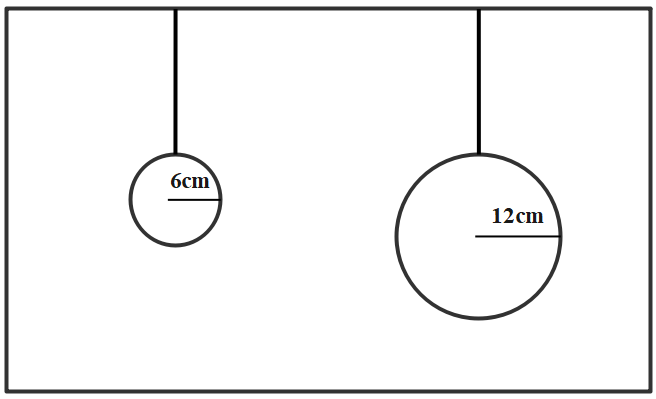Question
Question: Two copper spheres of radii \[6cm\] and \[12cm\] respectively are suspended in an evacuated enclosur...
Two copper spheres of radii 6cm and 12cm respectively are suspended in an evacuated enclosure. Each of them are at temperature 15∘C above the surrounding. The ratio of loss of heat is:
& A.2:1 \\\ & B.1:4 \\\ & C.1:8 \\\ & D.8:1 \\\ \end{aligned}$$Solution
To calculate the ratio of loss as heat, we can use the Stefan-Boltzmann law. Which gives the relationship between the radiation and the degree of the power. Since all the necessary quantities are given, we can substitute and calculate the ratio of heat emitted.
Formula used:
E∝T4 and E=σAΔT=4πr2σΔT
Complete answer:
Here, we have two spheres of the same material i.e. copper. Given that their radii are r1=6cm and the other is r2=12cm.

We know that radiation is the degree of how much power is emitter, reflected or transmitted by anybody.
Similarly we know that, according to Stefan-Boltzmann law, which states that, the total radiation of heat emitted from a surface is proportional to the fourth power of its absolute temperature.
E∝T4
E=σT4, where σ is the constant of proportionality called the Stefan-Boltzmann constant also, σ=5.670×10−8W/mK4
Also given as E=σAΔT=4πr2σΔT
Then the ratio is given as E2E1=4πr22σΔT4πr12σΔT
Since the ΔT for both the spheres are 15∘C, we get, the ratio of heat loss as E2E1=r22r12
Substituting the values for r1=6cm and r2=12cm, we get
E2E1=12262=(21)2=41
So, the correct answer is “Option B”.
Additional Information:
The Stefan-Boltzmann law talks about the heat emitted due to a black body in terms of temperature of the body. According to it, the total energy radiated per unit area of the black body across the wavelengths per unit time is proportional to temperature raised to the fourth power. It uses the basics of thermodynamics and Planck’s law.
This law is used to determine the temperature of the sun’s surface, radiations emitted by the stars and effective temperature of the earth.
Note:
The Stefan-Boltzmann law gives the radiation of heat produced due to a mass of an object. Also note that, since both the bodies are at same temperature, E∝A, where A is the area of the body. This law is used to determine the temperature of the sun’s surface, radiation emitted by the stars and effective temperature of the earth.
